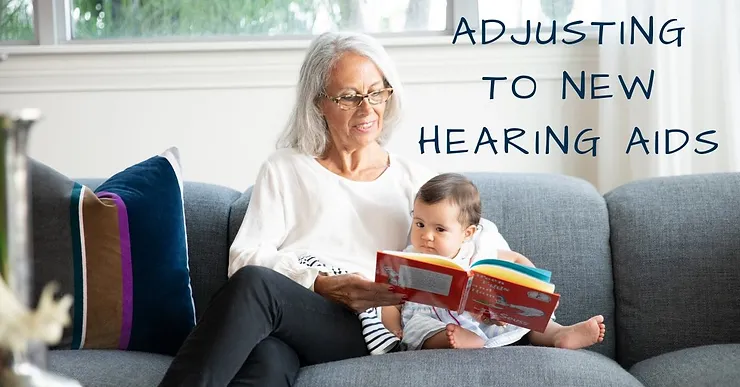
The early signs of hearing loss can be difficult to track in the moment. With hindsight, one can begin to track important occurrences: when you began turning up the volume on the television and radio, when you began asking friends and family to repeat themselves, et cetera. But often, most people wait several years before getting a hearing aid and forget what it is like to have normal hearing.
Adjusting to new hearing aids is akin to learning how to hear again. It is less like getting eyeglasses, which have a more immediate result in correcting our sight. A hearing aid will help you hear differently and your audiologist will help along the way.
The Fitting
After you take a hearing exam and receive your results, your hearing healthcare professional will discuss your thorough diagnosis with you. They will explain the levels of hearing loss in each ear and recommend next steps, and being fitted for hearing aids is a common outcome.
When you have a fitting appointment with your audiologist, they will fit you with a hearing aid based on your specific needs. Before selecting a hearing aid that might best suit you, your audiologist will ask you questions about your lifestyle and you should answer with as much detail as possible.
Do you live alone in a quiet environment or in a home with a big family? Some people have trouble hearing high pitched sounds of women and children, so this information would be essential to ensuring your hearing aid is tuned to recognize those tones and pitches. If you are employed, do you work in a cubicle or on a construction site? The Centers for Disease Control and Prevention estimates that about 25 percent of hearing loss in America is job related, so this information is helpful for your audiologist.
Your hearing aid will be physically fitted to sit comfortably around or in your ear and your audiologist will also test that the device’s settings are programmed correctly. You will also receive instructions on how to operate and care for your new hearing aid. The information may be a bit overwhelming, but your audiologist is there to address any questions you have and take the time to help you understand, during and beyond the appointment.
Best Practices
A new hearing aid will take some time to get used to. The physical feel of wearing it and also getting used to hearing differently will be new to you. It may take some time to get to a place where you are hearing comfortably, but it is important to be consistent in wearing your hearing aids.
Even if it irritates or frustrates you, it is important to keep wearing your hearing aids. You will be in regular communication with your audiologist during the fitting process and you have to inform them about how the device is working. This will allow them to fit the hearing aids more accurately, in turn making them work better for you.
It is also important to be keenly aware of your hearing in different environments and circumstances as you retrain your ears and brain to hear. When some sounds appear closer than they are or if you have trouble hearing certain frequencies, these are all things can your audiologist or hearing specialist can likely tune during a follow-up fitting appointment.
Clear Hearing and Audiology
As you become comfortable with your new hearing aids, know that you are not alone in your journey. At Clear Hearing and Audiology, our team is here to answer any questions you may have. We provide information about latest device technologies and we’re happy to be your support system in your transition to better hearing.
Our team is here to help you get used to your new hearing aids, so it’s important to keep us informed about your progress and setbacks. If you need more information about adjusting to new hearing aids, schedule an appointment with our team at Clear Hearing and Audiology today.
We provide comprehensive hearing health services, from tests to hearing aid fittings. If you’ve been struggling with hearing, why wait? Contact us today to get started on your journey to better hearing!
